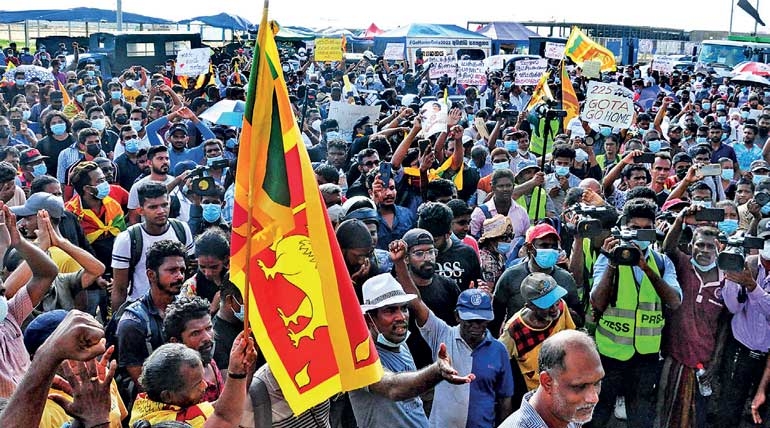Reboot Sri Lanka, a dire need for a complete ‘system change’

The word ‘manifesto’ traces its roots to the Latin ‘manifestum’, which means clear or conspicuous and presently defined as a document publicly declaring a set of ideas, opinions or views or the intention, position, program or plan of action of its issuer. Yet, it is understandable that the word ‘manifesto’ tends to have more disliking than not because the word has taken a beating over the decades in Sri Lanka.
Main causative factors for such repulsion towards ‘manifesto’ are undeniably associated with (a) blatant and repeated breaches of covenants and promises therein or non-delivery by respective political parties over many decades and (b) inherent legal barriers to hold those issuers of party manifestos, accountable for such misdeeds.
The physical act of writing your own manifesto on an actual page with an actual pen could be symbolically powerful. No doubt, as you press the words on the paper, they are naturally pressed into your mind as well!
In ancient Israel, the kings were required to write their own copy of the laws down. The core purpose being in any situation, whilst holding a public office, regardless of how difficult it may be, public officer should exhibit strength and control. Such officer ought to display the courage to stand steadfast in his principles for making just and righteous decisions, even in the face of impossible circumstances.
The unique concept of Individual Service Plan (ISP) by Citizens for Accountable Governance (CAG) provides an opportunity for future political contestant to reach out to his or her potential voters and prepare his or her action plan for delivery during his or her political tenure to that constituency, once elected. Wider participation of voters and non-voters alike, in preparation of this mini-manifesto (ISP) would warrant obtaining and delivery of public services which majority of people are commonly interested, unlike in the past.
One might see this process is somewhat akin to ‘primary election’ in the USA, whereby, in case of a particular political party, the people in respective constituency take over the power of nomination of the candidate from party leaders and influence the latter who they are willing to vote in, as the most suitable and credible candidate.
In Sri Lanka, customary internal selection of candidates by a party body and direct nomination by the party leader, without any personal accountability obligations towards constituents, has evidently proven an utter failure. At most such so-called people’s representatives had become mere lip-servers. Hence diminished confidence in politicians, here as a class. On that basis, repetitive assignment of their power by the people as repositories of sovereignty, to be exercised by their representatives in good faith, through the Public Trust Doctrine seems unlikely, at least in the foreseeable future. If so, how could we transform this CAG concept into a fresh start?
For any ‘system change’ to be widely accepted, such new system ought to be able to adequately address prevalent public outcry and resolve disparities which are commonly seen from the demands at the ‘Aragalaya’ across the island. That has to be via the empowerment of the people as stakeholders and by restoring accountability at every level. We see no rational escape therefrom!
For restoration of current next to nothing voter confidence and for establishment of accountability, as a foundation, CAG introduces a contractual scheme which replaces the habitual lip-service. Accordingly, the contestant voluntarily and irrevocably agrees to be held legally accountable and to comply with predefined annual administrative cycle. This entails submission of acceptable Individual Service Plan (ISP) as a mini-manifesto, submitting to implement the Master Plan, covenanting to comply with reporting obligations, progress reviews, transparency and conflicts of interest checks including key performance indicators and voter satisfaction surveys etc. and continuous rating scheme of respective individual by voters based on his performance, as promised.
Many minds susceptible to prevailed political culture would obviously question, why should any existing politicians with VVIP status ever enter into such legal obligations with voters? The paradigm shift emerging would either operate as a deterrent to such self-inflicted individuals or would open up plethora of opportunities to a new, capable and credible generation of politicians who are keen to be held accountable but nevertheless would not have contemplated to become one, in the prevailed shunned political climate in Sri Lanka for many decades.
In a revolutionary Sri Lanka, as part of this solution, a voter could communicate through online or mobile application and obtain services through same media or kiosks so that corruption could be minimised by lesser face-to-face interactions with public officers including politicians. Minimising face-to-face interactions with public officers was also recommended by the United Nations Convention against Corruption.
